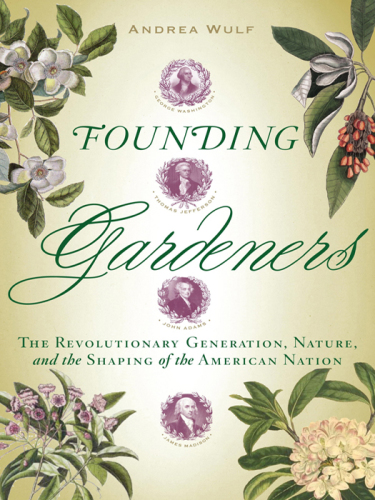
Founding Gardeners
The Revolutionary Generation, Nature, and the Shaping of the American Nation
کتاب های مرتبط
- اطلاعات
- نقد و بررسی
- دیدگاه کاربران
نقد و بررسی

February 21, 2011
Not only did Washington, Adams, Jefferson, and Madison operate farms, all believed agriculture was the noblest occupation and the foundation of democracy. All loved to talk about it, write about it, and spend leisure time (between building a nation) inspecting local farms. Scholars have not ignored this, but British design historian Wulf (The Brother Gardeners: Botany, Empire and the Birth of an Obsession) focuses on the agricultural passion that also reflected the political convictions of America's founders. Even while fighting the Revolution and governing the nation, Washington bombarded the manager of his beloved Mount Vernon with detailed instructions and insisted on prompt replies. During years of diplomatic service overseas, Adams and Jefferson toured private gardens and studied the latest agricultural techniques. This obsession went beyond the personal, influencing the design of Washington, D.C., and the White House, where Jefferson wanted only native shrubs and trees. Detailed botanical descriptions, garden layouts, and crop yields of their estates may appeal more to fans of horticulture than of history, but Wulf offers a delightful new perspective on the men we usually associate more with politics than with plants. 16 pages of color illus.; 19 b&w illus.

Starred review from February 15, 2011
Design historian Wulf (The Brother Gardeners: Botany, Empire and the Birth of an Obsession, 2009, etc.) explains how the Founders brought a new nation and their own gardens simultaneously to fruition.
Surely, the author goes too far to say that "it's impossible to understand the making of America without looking at the founding fathers as farmers and gardeners." Yet, by the time she concludes her brilliant discussion of plants and politics, how the Founders' enthusiasm for nature and agriculture, for gardening expansively defined, influenced and reflected their notions about government, readers will happily succumb to her boldness. Although she occasionally discusses Franklin, Hamilton and Benjamin Rush, Wulf focuses on the first four presidents, offering artfully composed, set-piece chapters on Washington's intentional "horticultural union at Mount Vernon...the first truly American garden"; Adams and Jefferson's educational, inspiring 1786 English garden tour; the model of harmonious, thriving plants from each state at Bartram's Garden, nearby Philadelphia, which may have assuaged Constitutional Convention delegates, over half of whom were farmers or planters; Madison and Jefferson's sly mix of botany and politics during their 1791 New England journey; and the portentous summer of '96, which found each man tending his garden, pretending not to care about politics. As they carved gardens out of the American forest, the Founders understood their agricultural and aesthetic decisions also as political acts, fundamental to their larger task of nation building. Whether she's addressing Washington's plans for the new federal city, Jefferson's unceasing renovations of his Monticello grounds, Adams' obsession with manure, Jefferson's ongoing argument with European naturalists over the merits of American flora and fauna or Madison's pioneering concern for conservation and natural balance, Wulf's scholarship, passion and pleasing prose make for a happy combination: a history book for gardeners, a gardening book for historians.
A fresh look at the Founders that charms even as it irresistibly convinces.
(COPYRIGHT (2011) KIRKUS REVIEWS/NIELSEN BUSINESS MEDIA, INC. ALL RIGHTS RESERVED.)

Starred review from March 15, 2011
The fresh and bountiful premise on which Wulf has built her second book of lively, biographical horticultural history (after The Brother Gardeners, 2009) is her conviction that to understand the making of America, one must view the Founding Fathers as farmers and gardeners. The love for indigenous trees and plants and the passion for cultivation shared by Washington, Adams, Jefferson, and Madison profoundly influenced the shape of American governancea claim Wulf substantiates through discerning study of their correspondence and close examination of the beloved plantations of Washington (Mount Vernon), Jefferson (Monticello), and Madison (Montpelier) as well as Adams modest Massachusetts farm (Peacefield). Relishing political conflicts as much as gardening lore, Wulf parses the founders belief in farming as both the most honorable way of life and the key to the new nations self-sufficiency. She then confronts the great paradox of this agrarian dream, that slaves made possible Washingtons, Jeffersons, and Madisons revolutionary landscape designs. Wulfs delectable anecdotal approach (backed by 100-plus pages of notes)Washington planning his garden while at Valley Forge, Jeffersons horticultural espionage, Adams joyful digging in the good earth, Madisons prescient call to preserve the environmentreveals each founders personality and perspective, while her dynamic analysis results in a paradigm-altering vision of how the balance of nature underlies our founding principles.(Reprinted with permission of Booklist, copyright 2011, American Library Association.)

























دیدگاه کاربران